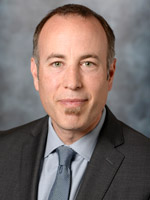Itai Danovitch, MD, MBA, DFAPA, DFASAM
Regional Director
Region II - California
 Itai Danovitch, MD, MBA, DFAPA, DFASAM. I am an academic addiction psychiatrist. I serve as Professor and Chairman of the Department of Psychiatry and Behavioral Neurosciences at Cedars-Sinai Medical Center in Los Angeles.
Itai Danovitch, MD, MBA, DFAPA, DFASAM. I am an academic addiction psychiatrist. I serve as Professor and Chairman of the Department of Psychiatry and Behavioral Neurosciences at Cedars-Sinai Medical Center in Los Angeles.
I earned my bachelor's degree from UC Berkeley and my medical doctorate from UCLA. I completed my psychiatry residency at Columbia, an addiction psychiatry fellowship at Cedars-Sinai Medical Center, and a Master of Business Administration at the UCLA Anderson School of Management. Before my current role, I served as Director of Addiction Psychiatry and the Addiction Psychiatry Fellowship at Cedars-Sinai.
My research is funded by the National Institute on Drug Abuse (NIDA) and the Patient-Centered Outcomes Research Institute (PCORI). I have authored over 80 articles and chapters and co-edited two books: Addiction—Psychiatric Clinics of North America and The Assessment and Treatment of Addiction—Best Practices and New Frontiers.
I am a Distinguished Fellow of the American Society of Addiction Medicine and a Distinguished Fellow of the American Psychiatric Association. In 2016, I was appointed by the Governor of California to serve as a Commissioner on the State Mental Health Services Oversight and Accountability Commission. I live in Los Angeles with my wife and three kids, with whom I aim to go hiking or backpacking in the Sierras every chance I get.
